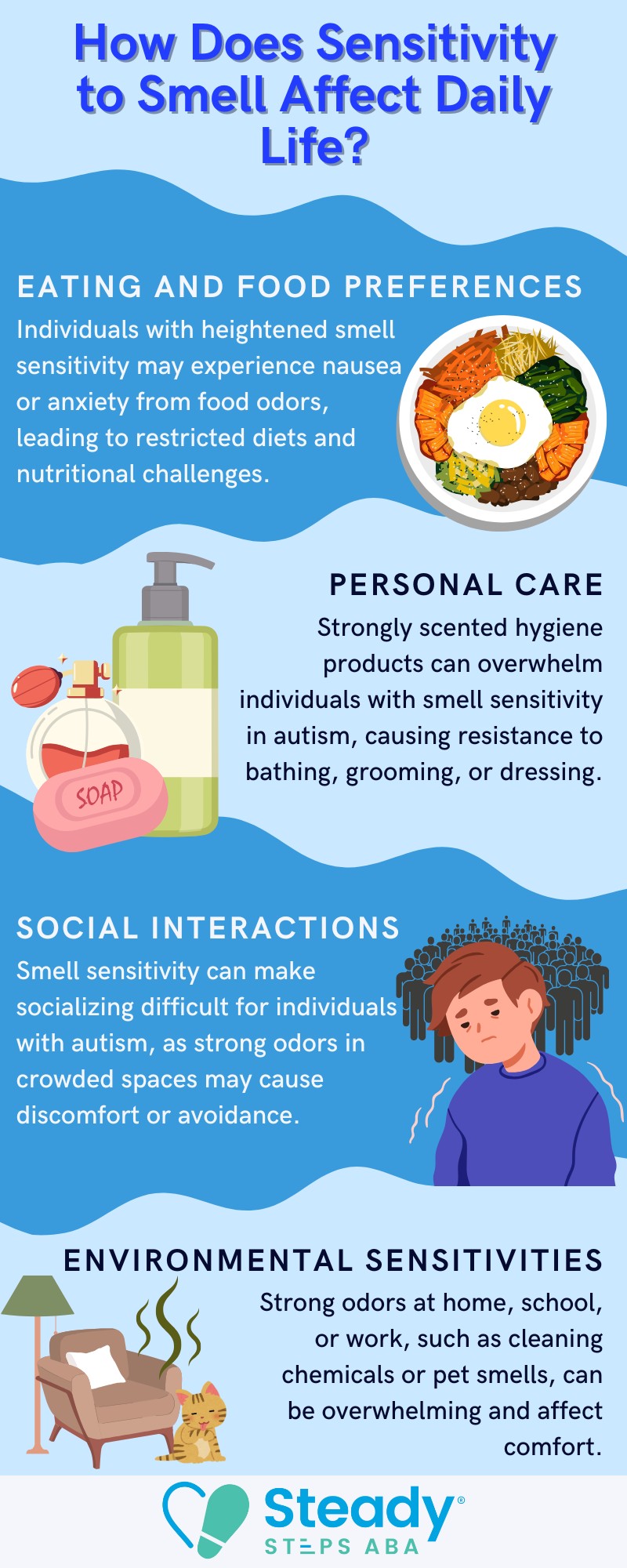Key Points:
- Sensitivity to smell in autism can lead to heightened emotional responses to odors.
- Smell sensitivities can affect daily activities like eating, grooming, and social interactions.
- ABA therapy can help individuals with autism manage and adapt to sensory sensitivities.
Autism Spectrum Disorder (ASD) affects millions of children and adults worldwide. One aspect of autism that is often overlooked is sensory sensitivity, including sensitivity to smell in autism. This can have a profound impact on daily life, influencing everything from food choices to social interactions. Understanding how individuals with autism perceive and respond to smells is key to providing the support they need.
What is Sensitivity to Smell in Autism?
Sensitivity to smell in autism refers to how individuals with ASD may experience smells more intensely or less intensely than others. For some, even common scents like perfumes, food, or cleaning products may cause discomfort or distress. For others, the inability to detect certain smells can create challenges in navigating their environment.
While many people experience sensory sensitivities, those with autism may have a particularly heightened sense of smell. It’s important to note that this can vary from person to person. Some may be overwhelmed by a faint scent, while others may be under-responsive and not notice strong odors.
In general, sensory processing difficulties are common in autism, affecting the way the brain interprets sensory information. This can cause someone with autism to either avoid certain smells or, conversely, seek out scents that provide comfort.
The impact of sensitivity to smell in autism can be far-reaching and affect multiple aspects of an individual’s life. These sensory experiences may lead to emotional distress, social challenges, and problems in completing everyday tasks.

Why Do Individuals with Autism Have Sensory Sensitivities?
Sensory sensitivities, including sensitivity to smell in autism, are thought to be linked to the way the brain processes sensory information in individuals with ASD. While the exact cause is not fully understood, research indicates that people with autism may have differences in brain connectivity that affect how they perceive stimuli.
Over or Under-Responsiveness to Sensory Inputs
Some individuals may have an overactive sensory system, meaning they experience certain stimuli, including smells, much more intensely than others. This can lead to discomfort or distress when exposed to particular odors. Conversely, others may be under-responsive and not register smells that others find overpowering.Neurological Differences
Studies have shown that people with autism may have differences in the way their sensory processing systems are wired, affecting their ability to filter and respond to sensory stimuli. This may contribute to sensory sensitivities, including those related to smell.Heightened Focus on Sensory Inputs
Individuals with autism may also focus more intensely on sensory inputs, which can cause them to become fixated on certain smells or objects. This can make it harder for them to ignore or filter out distracting stimuli, leading to heightened sensitivity.

How to Support Individuals with Sensitivity to Smell in Autism?
Understanding the challenges that come with sensitivity to smell autism can help families, caregivers, and educators create an environment that promotes comfort and well-being. Here are several strategies for managing sensitivities:
Minimize Overwhelming Smells
Where possible, reduce exposure to strong scents in the home, school, or other environments. This could mean avoiding strong perfumes, scented candles, or heavily scented cleaning products.Use Unscented Products
Choose unscented or hypoallergenic products for personal care, cleaning, and laundry. For individuals with sensitivity to smell in autism, this simple adjustment can make a big difference.Gradual Exposure
Gradually introducing different smells in a controlled environment can help individuals with autism become more comfortable with various scents. Over time, this process can desensitize them to odors that once caused distress.Offer Comforting Scents
Some individuals with autism may find certain smells comforting, such as lavender or vanilla. Offering these soothing scents in stressful situations can help create a sense of calm.Create a Calming Environment
Reducing overall sensory overload by minimizing noise, bright lights, and smells can help individuals with sensitivity to smell autism feel more at ease. Creating a designated “quiet space” with minimal sensory input can provide relief when they are feeling overwhelmed.
Can ABA Therapy Help with Sensitivity to Smell in Autism?
Applied Behavior Analysis (ABA) therapy can play a significant role in helping individuals with autism manage sensory sensitivities. ABA focuses on teaching individuals adaptive skills and helping them navigate challenges they may encounter in daily life.
Therapists trained in ABA can work with individuals to gradually expose them to different smells and teach coping strategies when overwhelming odors are encountered. Additionally, ABA therapy can help individuals develop communication skills to express their discomfort and needs in response to sensory overload.
ABA techniques can also help modify environments to make them more comfortable for individuals with sensory sensitivities. This includes adjusting the intensity of sensory input, whether it’s related to sound, touch, or smell.
Support Your Child with Steady Steps ABA
Understanding sensitivity to smell in autism is crucial in providing the right support for individuals with ASD. Sensory sensitivities, including those related to smell, can deeply affect daily activities and overall well-being. However, with the right strategies and interventions, individuals with autism can learn to manage their sensory experiences.
If you’re looking for ABA therapy to help your child with sensory sensitivities, Steady Steps ABA is here to support your family. Our experienced ABA therapists in Maryland provides personalized therapy that addresses your child’s unique needs, including sensory issues like sensitivity to smell in autism.
Contact us today to learn more about how we can help your child thrive through the power of ABA therapy!






